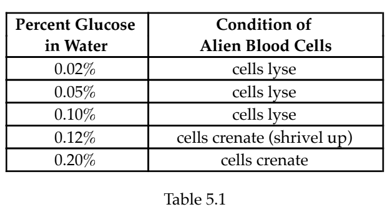Which membrane transport process(es) is/are abnormal in people with cystic fibrosis? What is the consequence of the abnormal transport? Which organ systems are affected? How is this disease treated? How long do cystic fibrosis patients normally live? What are some of the possible causes of death related to this disease? What is the cause of cystic fibrosis?
You are walking to school one day when you notice an alien spaceship that has crashed in a nearby field. You and some other physiology students collect samples from the beings inside of the spaceship. First, you collect a liquid sample of what appears to be alien blood so that you can test for the concentration of solutes inside the alien blood cells. You then extract some of these cells, place them in various concentrations of glucose in water, then look at them under the microscope. Below is what happens to the cells when they are placed in various concentrations of glucose:

Active transport of chloride is impaired, in the airways, sweat glands, and pancreas. The affected epithelia are involved in production of sweat and mucus. Thus the respiratory, integumentary, and digestive systems are
affected. Treatments include replacement of pancreatic digestive enzymes, which are blocked from secretion by the mucus buildup in secretory ducts, and respiratory therapies to loosen mucus in the airways and treat recurring infections. Gene therapy is being explored as well. Median survival is 37 years as of the publication date of the textbook. Causes of death can be related to malnutrition and respiratory illness. This is a genetic disease, in which the gene coding for the chloride transporter is abnormal.
You might also like to view...
What is the role of vitamin C in bone growth?
A. It is necessary for the absorption of calcium by the digestive system. B. It stimulates osteoblast activity. C. It promotes the cross-linking of collagen molecules in bone. D. It promotes synthesis of the glycosaminoglycans (GAGs) of the bone matrix. E. It promotes proliferation of cartilage at the epiphyseal plates.
Define disinfectant
What will be an ideal response?
A host cell is the body cell of an infected individual
Indicate whether the statement is true or false
Most body water intake is from ________, whereas most body water lost is via ________
A) drinking; urine B) metabolic water; cutaneous transpiration C) drinking; cutaneous transpiration and expired air D) metabolic water; sweat E) drinking; radiation